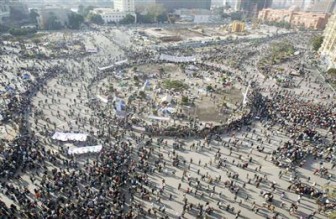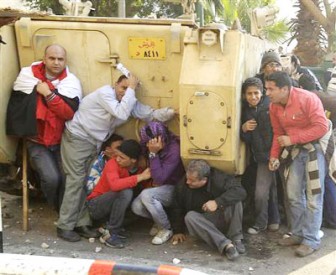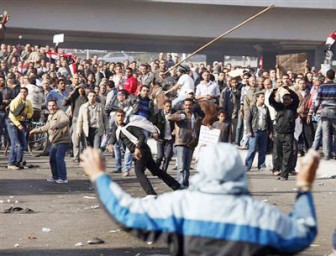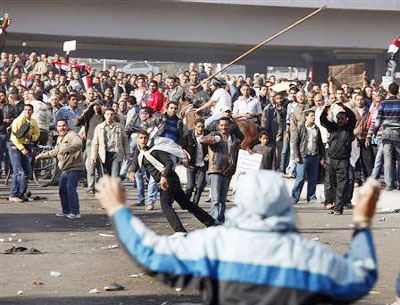CAIRO, (Reuters) – Violence against Egyptian protesters by Hosni Mubarak loyalists appeared to backfire yesterday, drawing criticism from the United States, which hardened its stance on the president’s political future.

The activists who have staged unprecedented protests against Mubarak said the rough tactics had also hardened their resolve.
The extent of their determination will become clear tomorrow, when the protesters have called another mass rally to demand the 82-year old president step down.
Scenes of men claiming loyalty to Mubarak armed with sticks and knives might also have undermined some of the sympathy the president generated during his televised address on Tuesday, when he announced he would not seek re-election in September.
But public relations appeared to be of no importance to whoever was behind the violence: reporters were also attacked, including foreigners, in what the Committee to Protect Journalists said was an effort at “blanket censorship”.

By nightfall, the protesters were still holding their ground in Tahrir Square, scene of yesterday’s violence and the hub for the anti-Mubarak protests over the last week. Whether they stay or leave might not matter that much.
The anti-Mubarak protest movement has generated great momentum over the last nine days. Were the protesters to leave the square, they would likely be able to regroup for Friday, harnessing the social media that allowed them to organise.
“If they’re attacked as they were today, by armed young men, then there’s the potential for real instability,” said Elijah Zarwan, a senior Cairo-based analyst with International Crisis Group. “I fear it could be a harbinger of further unrest.”
In Washington, a vital ally for Egypt, a senior U.S. official, speaking privately, shared the assessment of protesters and witnesses in Cairo that someone loyal to Mubarak had unleashed gangs of armed men to intimidate the protesters.
“UNCLE MUBARAK”
In London, British Prime Minister David Cameron also took seriously the idea that the government was behind the violence.
“If it turns out that the regime in any way has been sponsoring or tolerating this violence, that would be completely and utterly unacceptable. These are despicable scenes that we’re seeing,” Cameron told reporters.

Speaking after a day of violence in which at least three Egyptians were killed and 1,500 wounded, White House spokesman Robert Gibbs said the United States wanted an immediate start to some form of unspecified transition. “Now means now,” he said.
U.S. Secretary of State Hillary Clinton told Omar Suleiman, appointed deputy president by Mubarak this week, that a transition has to begin now.
In his speech on Tuesday, Mubarak, ruler for three decades, offered concessions including promises of constitutional reform.
That was not good enough for the protesters, who are seeking his immediate exit and deep change in the way the autocratic Arab state is governed. More than a million people demonstrated across the country on Tuesday.
In an effort to counter the anti-Mubarak tide, loyalists had staged peaceful protests across Cairo earlier in the day, focusing on his promises of reform. In one, children with “Uncle Mubarak” daubed on their cheeks waved the Egyptian colours.
Yet by mid-afternoon, scenes of men on horses and camels, armed with whips and sticks, charging the protesters in Tahrir Square dominated live coverage by Arab satellite networks.
Journalists were among those attacked by Mubarak loyalists on Wednesday, the New York-based Committee to Protect Journalists said.
“What happened has cast a very negative shadow on the Mubarak government. It tarnishes his image abroad,” said Mustapha Kamel al-Sayyid, a political scientist.
Hassan Nafaa, a political scientist and leading opposition figure, said the violence was a “stupid, desperate move by the ruling National Democratic Party and state apparatus”.
“This will not put an end to the protests,” he said. “This is not a Tahrir Square revolution, it is a general uprising.”

